League Recognizes City Leaders
By Andrew Tellijohn
The C.C. Ludwig Award for elected city officials, James F. Miller Leadership Award for appointed officials, and the Emerging Leader Award for city officials with less than eight years of experience were presented by the League of Minnesota Cities (LMC) at the 2023 Annual Conference.
These awards honor individuals who have consistently done outstanding work to improve the quality of their own cities as well as cities throughout the state. The 2023 winners are Marshall Mayor Bob Byrnes, Chatfield City Administrator Joel Young, and Wayzata Community Development Director Emily Goellner.
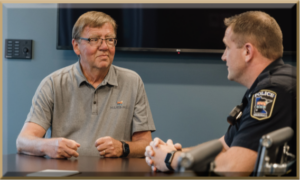
Bob Byrnes retired from the University of Minnesota Extension in 2019 after 40 years of service, but when it’s all said and done, that job may not be his longest tenured role.
Byrnes has served as mayor of Marshall since 1992 after having been a City Council member for six years.
In 1986, Byrnes says, there was a neighborhood concern about a conditional use permit. Learning about that sparked an interest in how the city works, so he ran for office.
When his predecessor decided not to run for mayor again in 1992, several members of the business community asked him to step up to be a candidate for mayor. He’s had the role, largely unopposed, ever since.
“It’s a testament to the community support he has,” says City Administrator Sharon Hanson. “I think it’s pretty rare and an indication that there’s trust between him and the residents that he serves.”
Diving in with floods
Immediately after Byrnes became mayor, Marshall suffered significant flooding on Mother’s Day, Father’s Day, and the Fourth of July.
“I had to learn fast,” he says. “That was an important learning experience and it really drove home for me the importance of planning and strong infrastructure, so the community is not at risk.”
Byrnes took several steps, including testifying before Congress, to secure funding for infrastructure improvements.
“You can never say it will never happen again, but we have had three storm events where the velocity in the river going through Marshall exceeded anytime previous in history,” he says. “We haven’t had a flood since 1993.”
Hanson wasn’t yet in Marshall during this time, but she’s gotten a sense for how Byrnes’ temperament helped keep the city together as it was dealing with those improvements.
“No matter what the situation could be, it could be flooding, or COVID, or some other emergency event, he provides a calming presence,” she says.
Other issues of importance
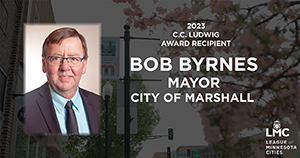
Those early days were stressful, but they gave Byrnes perspective for dealing with other issues.
“A lot of times what we think are big problems, in the scope of things, are not,” he says.
That said, he’s overseen a lot since joining the Council. City and civic leaders say Byrnes’ leadership was crucial in convincing Turkey Valley Farms to relocate there in 2004.
He championed the construction of a new YMCA facility in 2002 and argued for the implementation of a local option sales tax in 2013 that made possible the construction of the Red Baron Arena and Expo, which has allowed the city to host larger events.
He spearheaded the construction of the Marshall-Lyon County Library, led discussions on where to locate a new City Hall, helped establish the 9/11 Memorial Park, and he’s a proponent of the area’s many bicycle trails in and around Marshall.
“You have to pay attention to all of the things that impact the quality of life and why families choose to live in your community and work in the community,” he says. “That’s a lot of things. It’s important to work strategically.”
Part of that, Hanson says, comes in pulling for others to succeed.
“He’s an ardent supporter of staff and encouraging personal development and flexibility,” she says. “I have seen him, on a number of occasions, really encouraging people to get involved with outside groups locally and across the state.”
Regional focus
Over the years Byrnes has gotten involved outside Marshall, as well, taking a leadership role on numerous regional issues such as transportation.
He serves on the board of directors for the Southwest Regional Development Commission, is past chair of the Prairieland Economic Development Corporation, chair of the Minnesota Department of Transportation’s Area Transportation Partnerships board, leads the Highway 23 Coalition board, and serves on the board for Habitat for Humanity of Redwood River.
He’s been on the Highway 23 Coalition for several years, including a stint as its coordinator. That group advocates for expansion of the highway and for safety projects, and it would like to see the road expanded to four lanes in the Marshall area.
In recent years, Byrnes helped formalize the Southwest Minnesota Council of Mayors, a growing group of mayors who had met informally for years but decided to create an official organization to present a unified voice on tuition forgiveness to students from South Dakota.
“Bob organized and contacted mayors of every town that hosts a postsecondary institution or technical college and, of course, [Southwest Minnesota State University] in Marshall,” says Granite Falls Mayor Dave Smiglewski. “As a group we spoke as one voice advocating for tuition forgiveness. Coming together, you realize how many things we have in common.”
While the proposal didn’t pass, the group will remain united in pursuing additional issues in the future.
“Our voices individually maybe aren’t heard as much as our voices if we work together,” Byrnes says. “That’s how it started. We’re all dealing with the same issues.”
The organization’s growth is largely due to Byrnes’ vision.
“He’s got a very farsighted vision of what we are doing today and how that will affect those who come after us,” Smiglewski says. “It is so refreshing to work with people like that and a great example of really productive and thoughtful leadership.”
Servant leadership
While he’s three decades into this job, Byrnes isn’t ready to announce any slowdowns. He attributes any success to a strong team and taking the long view.
“It’s not about the individual, it’s about the citizens you serve,” he says. “It’s really about the strategic goals that the community has agreed on and how are we going to accomplish that?”
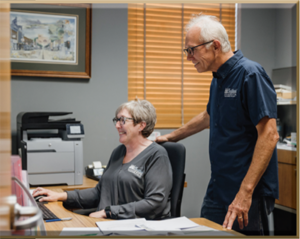
James F. Miller Leadership Award winner. (Photo by Matt Wales)
When Joel Young moved to Chatfield with his wife in 1983, he thought they would be there a few years and then move on. He and his wife were talking about starting a family and he was looking for a quieter lifestyle with less travel.
So, he established a financial planning business, got involved in several civic and business organizations to meet potential clients, and, when his predecessor left for another city, took a new job as city clerk in 1991.
He never left.
“I loved doing all those different community activities,” he says. “I had an interest in politics that allowed me to talk to people and had written a small cities development program grant, so I got to know the city well.”
Now, after more than 30 years of service and recently becoming Chatfield’s first city administrator, he’s decided to retire, though many in the community aren’t ready to see him leave.
“When they asked me what I wanted in his replacement, I said ‘I want a clone of Joel,’” says City Councilor Pam Bluhm, who also owns the Chatfield News.
Chatfield Center for the Arts
The highest profile project Young helped complete during his years with the city is the renovation of the old elementary school into the Chatfield Center for the Arts.
The city’s first referendum for a new elementary school failed in the late 1990s, but that effort did start community discussion on what would become of the older building, if it was replaced.
New iterations had come along in 1916 and 1936; the property had housed some sort of school building since the 1860s.
When a referendum did pass years later, a group of community members convened to discuss the building’s future and determined it should leverage the community’s history with music, theater, and the arts.
Young, along with Chatfield Center for the Arts board member Michael Martin, met with legislators, testified in front of committees, and worked countless hours to bring in funds totaling more than $14 million across two separate state bonding bills enabling the project to move forward.
The building first began hosting local, state, and national arts events in 2010, operating through the first phase of renovation from 2014-16. It closed briefly during the second phase, between 2020 and 2022. Upon completion, the grand reopening was held in late 2022.
“We, as a community, are really happy and proud of that space and what it will mean to the region and the community,” Young says. “It’s a highly visible project.”
Less visible work
Many of Young’s additional contributions to Chatfield have been lower profile, but no less important. He helped put together personnel policies and compensation systems that formalized a lot of processes the city had never before put on paper.
More recently, he helped amend the city charter, which added the city administrator role he now holds.
“Our city didn’t have a lot of that stuff in place, so I got to develop a lot of policy and things of that nature,” he says. “No one is going to care about that stuff except the organization, but those are some things I look back on and think ‘I was glad to be part of that.’”
He’s also contributed to the development of a new swimming pool, a wastewater treatment facility, renovations and additions to the Thurber Municipal Building, and a new water tower. He’s big on transparency, collaboration, and cooperation, as evidenced by the completion of the infrastructure related to building the new elementary school.
Outside the city
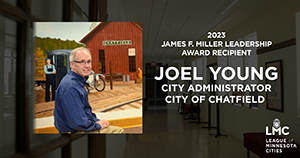
Young also has taken on a number of leadership roles outside the city working with the League, Rochester Area Economic Development Inc., Arc Southeastern Minnesota, and many more organizations. One, in particular, owes its very existence to Young, says Brenda Johnson, executive director of the Southeastern Minnesota League of Municipalities.
Her organization was on the brink of shutting down due to lack of participation and new membership when Young attended an event with Johnson, who was a new Chatfield City Council member at the time.
By the time they left, Johnson says Young had spoken to members about the value he saw in the organization and its need to keep representing area counties. And he had talked Johnson into becoming its next board vice president. It has since grown its representation from three counties to 11 and built a strong voice representing its issues of importance.
“He is a master of recruitment,” Johnson says. “Nobody else was really stepping forward with an idea of what to do. If it had not been for Joel trying to find that vision, the inertia would have just continued.”
Taking time off
For all the projects that Young has overseen, the speeches he’s given, and the networking he’s spread, Bluhm says she’s simply going to miss his presence.
“He is so organized,” she says. “I’ve never seen him lose his temper. Everything is even keel. He can sweet talk a bee into not biting you.”
But after 30 years of largely nonstop work, Young says he’s ready for the next step. He has some ideas about where he may end up contributing, but nothing set in stone. Of his plans, he says: “I don’t have any. I’m going to take a little break and see where life leads me.”
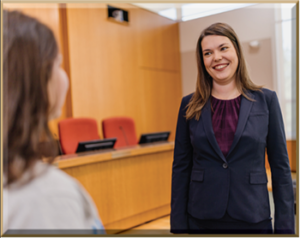
Wayzata community development director
Emerging Leader Award winner. (Photo by Matt Wales)
Since joining the city of Wayzata as its first female community development director in 2019, Emily Goellner has increased the size of her department from three to five.
She’s led the establishment of arguably the state’s most complex tax increment financing district, which will generate more than $29 million for redevelopment, infrastructure, and other improvements.
She’s taken a leadership role in a significant lakefront improvement project, worked with city residents to remove discriminatory covenants from their properties, and worked with several organizations from the Urban Land Institute (ULI) to the Minnesota Planning Association to step up diversity, equity, and inclusion.
And she’s the mother of two young children. It’s all about staying a few steps ahead.
“I have a lot of energy. I just channel that energy appropriately toward my goals,” she says. “I tend to have a strategic eye on things. I’m always thinking about what six months ahead looks like and what a year ahead looks like. I’m very future oriented.”
Panoway on Wayzata Bay
When Goellner arrived in Wayzata, City Manager Jeffrey Dahl wasted no time putting her to work on the significant lakefront improvement project called Panoway on Wayzata Bay.
The project will add a 1,500-foot linear park in the middle of its destination downtown while restoring lakeshore ecology, creating multi-modal regional connections, preserving the history of the railroad, and ensuring that “you don’t have to own a $2 million property to enjoy Lake Minnetonka,” Dahl says.
“I was really interested in working on a legacy project where I could bring my kids to see the project in many years to come and say, ‘I helped this community get this done,’” she says. “It was their idea and I helped them make it real. I love that feeling.”
Motivates others
While she is highly self-motivated, Dahl has been impressed with Goellner’s ability to motivate others. Early on, as she began conducting icebreakers with her team so they would get to know each other better, he saw she was ahead of other young leaders.
“Being intentional about that is usually not something a young or newer leader can hit the ground running on,” he says. “Knowing that she understands fostering those relationships really was the foundation of everything that she can accomplish as director, that was where I said, ‘she’s going to be very successful.’”
She does a tremendous job of empowering colleagues, turning mistakes into learning opportunities, and assembling a diverse workforce whose strengths and personalities complement one another. “She realizes it’s good to not have five other people exactly like yourself,” Dahl says.
Tackling equity
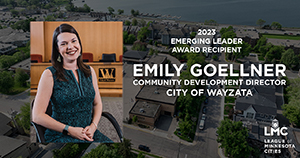
Goellner maintains a strong commitment to diversity, even when it means the city and its residents must take a close look at their own behaviors.
She has worked with local homeowners, through the Just Deeds Project, to nullify decades-old discriminatory covenants on their properties. Goellner wants to do the right thing in correcting them going forward.
“It was a way of excluding people of color from living in thriving, beautiful suburban communities and in urban communities,” she says of those past practices. “We, as a collective, have the responsibility of, when we get information about past wrongs, we need to accept that and do better.”
She tries to make it a teaching experience, educating those who were unaware of the practice and how racial diversity was an issue in earlier Wayzata days. She wants to level the playing field for people of color who have been denied equal opportunities to establish generational wealth for their families.
“I’ve always been an advocate for the underdog,” she says. “I tend to carry that advocacy through to professional organizations. I’m really interested in seeing more women in leadership roles and more people of color in planning roles and municipal government.”
That advocacy has carried over into her work with the ULI, says Lynette Dumalag, the organization’s chair and a St. Louis Park City Council member.
“She’s prioritized getting underrepresented groups into our industry,” Dumalag says. “Emily was vital in the creation of a task force to see how we could work on getting a new pipeline of leaders who are of diverse backgrounds within the organization and help members if they are under resourced.”
Planning for the future
Goellner has also been an active and eager volunteer when needed on other ULI issues, Dumalag adds. “I’ve always found her super engaging, a great contributor,” she says.
While entirely engaged by her work in Wayzata, Goellner’s future-oriented nature has her constantly refining goals for down the line, as well.
She wants to pursue a Ph.D. related to leadership in the public sector, city planning, diversity, equity, and inclusion.
She also wants to add public speaking to her toolkit, and to testify on behalf of bills she believes in at the Legislature. Additionally, she’d like to become a professor, teaching young people about the industry. “I want to be that communicator,” she says.
Dahl says he’ll encourage her to explore opportunities beyond Wayzata, but will keep her busy with important city-based projects as well.
“What’s clear with Emily is the more challenges I give her, the more motivated she is,” he says. “She’s driven by impact and having that sense of purpose. As long as I give her that chance to have a positive impact on people’s lives, I think she’ll be pretty satisfied with what she’s doing.”
Andrew Tellijohn is a freelance writer.

